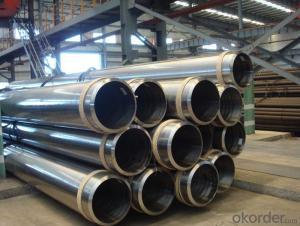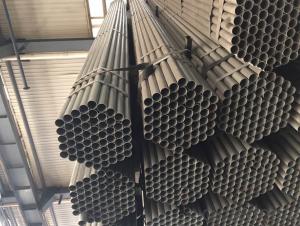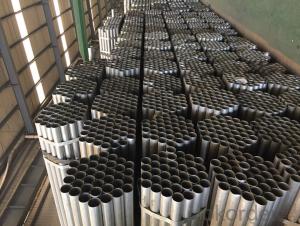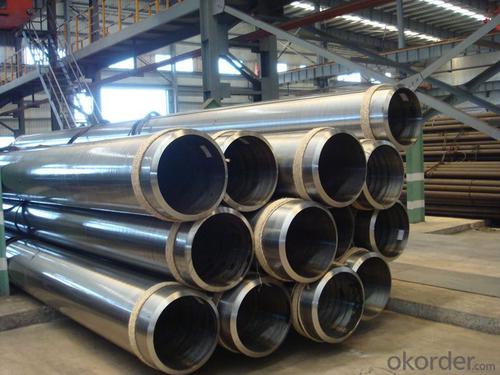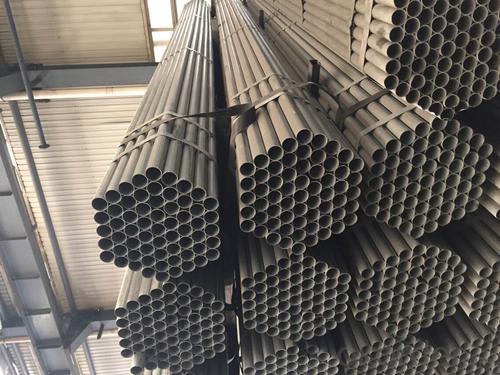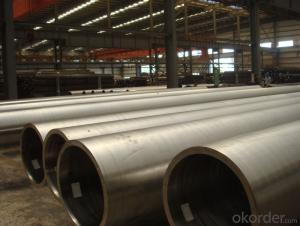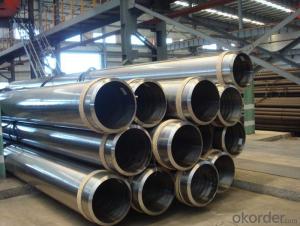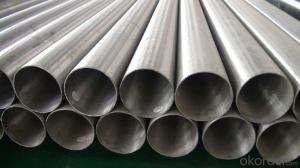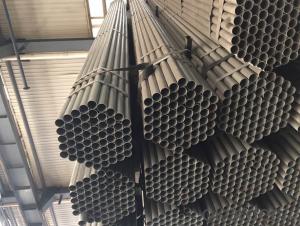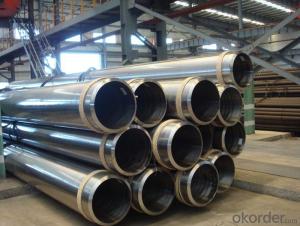Stainless Steel Welded Pipe ASTM A358/A316/A312
- Loading Port:
- Tianjin
- Payment Terms:
- TT or LC
- Min Order Qty:
- 60 m.t.
- Supply Capability:
- 10000 m.t./month
OKorder Service Pledge
OKorder Financial Service
You Might Also Like
1、Structure of Stainless Steel Welded Pipe ASTM A358/A312/A316 Description:
Stainless steel welded pipe is actually a cover term, covering a wide range of alloy and making them suitable for different attributes that are used in a very wide and large numbers of different industries. Stainless steel pipe is resistant to erosion, highly flexible, powerful, easy to use, and can be done in distinct approaches, which means that more and more stainless steel was used as a construction material for large-scale, high impact buildings.
2、Main Features of the Stainless Steel Welded Pipe ASTM A358/A312/A316:
• High manufacturing accuracy
• High strength
• Small inertia resistance
• Strong heat dissipation ability
• Good visual effect
•Reasonable price
3、Stainless Steel Welded Pipe ASTM A358/A312/A316 Images:
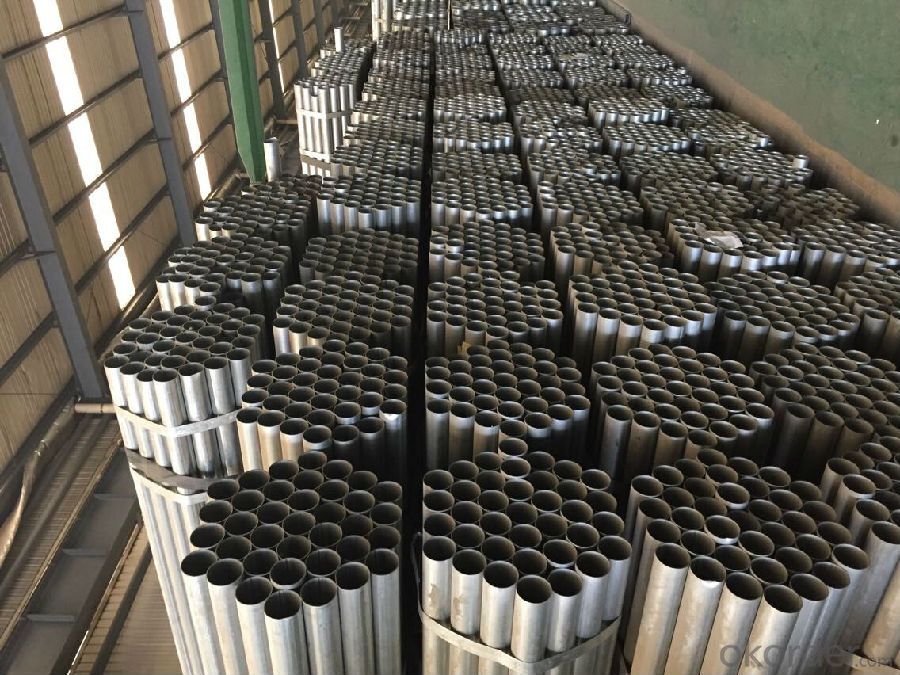
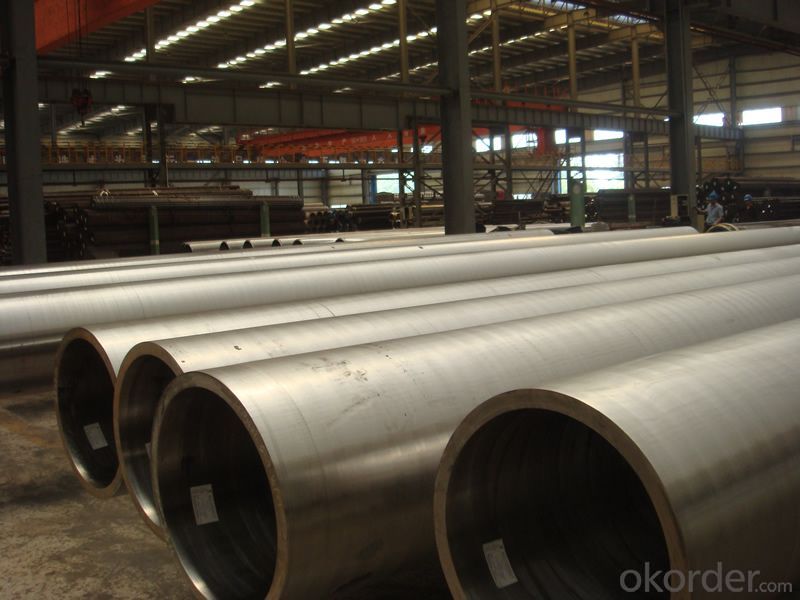
4、Stainless Steel Welded Pipe ASTM A358/A312/A778 Specification:
Size:
| Standard | Outside(mm) | Thickness(mm) | Length(mm) | |
| ASTM A312 | ≤48.26 | -0.4 | +No special provisions(Unspecified)-12.50% | Appoint LengthDefinite cut length+6.40 |
| >48.26~114.30 | 0 | 0 | ||
| >114.30~219.08 | 0.8 | |||
| >219.08~457.20 | 1.6 | |||
| >457~660 | -4 | |||
| >660~864 | -5 | |||
| >864~1219 | -5.6 | |||
Tolerances on dimensions table:
| Outside diameter | Outside | Thickness | ||||
| SCH 5S | SCH 10S | SCH 20S | SCH 40S | |||
| (A) | (B) | mm | mm | mm | mm | mm |
| 350 | 14′ | 355.6 | 3.96 | 4.78 | 7.92 | 11.13 |
| 400 | 16′ | 406.4 | 4.19 | 4.78 | 7.92 | 12.7 |
| 450 | 18′ | 457.2 | 4.19 | 4.78 | 7.92 | 14.27 |
| 500 | 20′ | 508 | 4.78 | 5.54 | 9.53 | 15.09 |
| 550 | 22′ | 558.8 | 4.78 | 5.54 | 9.53 | 15.09 |
| 600 | 24′ | 609.6 | 5.54 | 6.35 | 9.53 | 17.48 |
| 650 | 26′ | 660.4 | 5.54 | 7.92 | 12.7 | 17.48 |
| 700 | 28′ | 711.2 | 5.54 | 7.92 | 12.7 | 17.48 |
| 750 | 30′ | 762 | 6.35 | 7.92 | 12.7 | 17.48 |
| 800 | 32′ | 812.8 | 7.9 | 12.7 | 17.48 | |
| 850 | 34 | 863.6 | 7.92 | 12.7 | 17.48 | |
5、FAQ of Stainless Steel Welded Pipe ASTM A358/A312/A778:
①How is the quality of your products?
Our products are manufactured strictly according to national and internaional standard, and we take a test on every pipe before delivered out. If you want see our quality certifications and all kinds of testing report, please just ask us for it.
Guaranteed: If products’ quality don’t accord to discription as we give or the promise before you place order, we promise 100% refund.
②How about price?
Yes, we are factory and be able to give you lowest price below market one, and we have a policy that “ for saving time and absolutely honest business attitude, we quote as lowest as possible for any customer, and discount can be given according to quantity”,if you like bargain and factory price is not low enough as you think, just don’t waste your time.Please trust the quotation we would give you, it is professional one.
③Why should you chose us?
Chose happens because of quality, then price, We can give you both.Additionally, we can also offer professional products inquiry, products knowledge train(for agents), smooth goods delivery, exellent customer solution proposals.Our service formula: good quality+good price+good service=customer’s trust
SGS test is available, customer inspection before shipping is welcome, third party inspection is no problem.
Any question, pls feel free to contact us !
- Q: What material is RHS in the steel tube?
- SHS stands for thin-walled square steel tubes in the structure and represents the self ignition ceramic composite steel tube in the material
- Q: What is the difference between black steel pipes and galvanized steel pipes?
- Black steel pipes are made of carbon steel and are typically used in gas or oil lines, while galvanized steel pipes are coated with a layer of zinc to protect against corrosion. Galvanized pipes are commonly used in plumbing systems and outdoor applications.
- Q: What are the different end finishes for steel pipes?
- The different end finishes for steel pipes include plain ends, beveled ends, threaded ends, and grooved ends.
- Q: Are steel pipes suitable for structural applications?
- Indeed, steel pipes prove to be appropriate for structural applications. Renowned for their strength, durability, and versatility, steel pipes emerge as an ideal choice for diverse structural purposes. They can be utilized in constructions, bridges, stadiums, and other edifices to provide essential support and stability. Steel pipes exhibit remarkable tensile strength, enabling them to withstand substantial burdens and resist deformation when subjected to pressure. Moreover, their resistance to corrosion renders them dependable for structural applications, even in severe environments. The utilization of steel pipes in structural applications is further amplified by their cost-effectiveness and ease of installation. In summary, owing to their strength, durability, versatility, and cost-effectiveness, steel pipes remain a favored option within the construction industry.
- Q: How are steel pipes connected or joined together?
- Steel pipes are commonly connected or joined together through welding, threading, or using pipe fittings such as couplings, flanges, or unions.
- Q: How are steel pipes used in plumbing?
- Steel pipes are commonly used in plumbing for various applications such as water supply and drainage systems. They provide durability, strength, and resistance to corrosion, making them suitable for both residential and industrial plumbing. Steel pipes can be used for transporting water, gases, and other fluids, and are often connected with fittings and valves to create a reliable and efficient plumbing system.
- Q: Is the electric pipe used with steel pipe or PVC pipe?
- Electric pipe laying is generally divided into the following circumstances:1) the explosion-proof area must be galvanized steel pipe and explosion proof flexible pipe (used for front end equipment connection);2) non explosion-proof area can use KBG pipe or PVC tube, the former is higher cost, but the installation is firm, the latter is low cost, easy to construction, and in the rain where it will not rust, but compared to the KBG pipe may be damaged.
- Q: Are steel pipes suitable for chemical processing plants?
- Steel pipes are commonly used in chemical processing plants due to their excellent strength, durability, and resistance to corrosion. Steel pipes, especially those made of stainless steel or alloy steel, can withstand high temperatures, pressure, and the corrosive effects of various chemicals. This makes them suitable for transporting and containing different types of chemicals in a safe and efficient manner. Additionally, steel pipes are easy to install, maintain, and repair, making them a cost-effective choice for chemical processing plants. However, it is important to select the appropriate type of steel and consider factors such as the specific chemicals being processed, the operating conditions, and any potential risks or compatibility issues. Regular inspections and maintenance are also essential to ensure the integrity and performance of steel pipes in chemical processing plants.
- Q: Why should the weak electricity be pre buried with galvanized steel pipe?
- Galvanized steel pipe with hot-dip galvanizing or galvanized coating on it. Galvanizing can increase the corrosion resistance and prolong the service life of the steel pipe. The use of galvanized pipe is very wide, except for water, gas, oil and other general low pressure fluid pipeline, is used in petroleum industry especially offshore oil well pipe and oil pipe, chemical coking equipment oil heater, cooler, oil pipe exchanger for coal distillation, and support piles, Zhanqiao mine tunnel the tubes.
- Q: Can steel pipes be used for heat transfer applications?
- Yes, steel pipes can be used for heat transfer applications. Steel is a good conductor of heat, which makes it an excellent choice for transferring thermal energy from one place to another. Steel pipes are commonly used in various heat transfer systems such as heating, ventilation, and air conditioning (HVAC) systems, industrial process heating, and steam distribution networks. The high thermal conductivity of steel allows for efficient heat transfer, ensuring that heat is effectively transported and distributed throughout the system. Additionally, steel pipes have good strength and durability, making them suitable for withstanding high temperatures and pressures often encountered in heat transfer applications. Overall, steel pipes are a reliable and widely used solution for heat transfer purposes.
Send your message to us
Stainless Steel Welded Pipe ASTM A358/A316/A312
- Loading Port:
- Tianjin
- Payment Terms:
- TT or LC
- Min Order Qty:
- 60 m.t.
- Supply Capability:
- 10000 m.t./month
OKorder Service Pledge
OKorder Financial Service
Similar products
Hot products
Hot Searches
Related keywords
